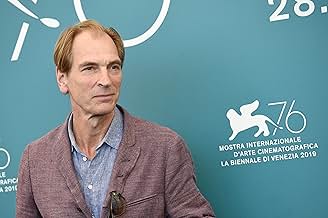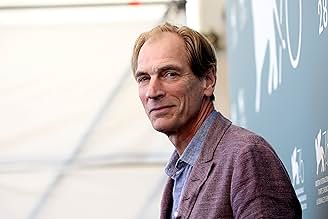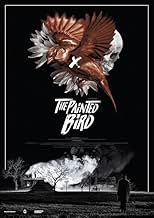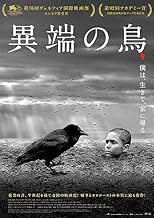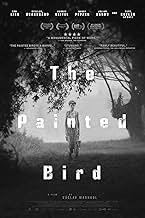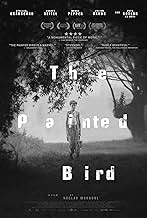IMDb RATING
7.3/10
8.3K
YOUR RATING
A young Jewish boy somewhere in Eastern Europe seeks refuge during World War II where he encounters many different characters.A young Jewish boy somewhere in Eastern Europe seeks refuge during World War II where he encounters many different characters.A young Jewish boy somewhere in Eastern Europe seeks refuge during World War II where he encounters many different characters.
- Awards
- 24 wins & 24 nominations total
Nina Sunevic
- Marta
- (as Nina Shunevych)
Marika Sarah Procházková
- Woman #1
- (as Marika Procházková)
Featured reviews
This is like a gift giver that just keeps on giving. Never once throughout the almost three hour run time was I bored. I was captivated from the very first minute right up until the final fade out.
We follow a young Jewish boy trying to survive amidst the chaos of World War II. His luck is horrible and he is subjected to a series of abuses and abusers.
Stay with him, the Painted Bird pays off and will linger in your mind long after you've seen it.
9/10
We follow a young Jewish boy trying to survive amidst the chaos of World War II. His luck is horrible and he is subjected to a series of abuses and abusers.
Stay with him, the Painted Bird pays off and will linger in your mind long after you've seen it.
9/10
Heavy. It's a series of chapters displayed by a photography both stunning and merciless. Human beings here are foundamentally cruel (with a couple of exceptions) and cruelty flows from the oppressor to the oppressed. The movie reminds us about that.
The ending has being discussed, but I think that, just maybe, the protagonist can still hope for a better future.
A young Jewish boy and the extreme abuse (quite hideous, alarming at times) and suffering inflicted upon him during WWII by some exceptionally evil and wicked people; slightly loses traction with a few too many frying pan fire cycles to emphasise the point, a shocking experience nonetheless, albeit a very long one. Whether the world still needs this kind of stylisation of the effects of war remains debatable, as does its impact on the memories and emotions already formed over so many years and by so many.
It's an eastern european movie at its core: raw, uncompromising, brutal, dim, hopeless and honest.
Brutality actually lead to several people leaving the screening I attended to at Venice 76. Here, this movie was labeled as '14+' but I believe it can be easily rated NC-17. The brutality of this movie includes some very graphic gore (although it's mostly present in the first half of the movie) and sexual-related violence (mostly implied but persistent throughout the film). I believe that, as of on-screen depiction of violence, this film probably outranks Schindler's List (although It isn't as vast scaled as Spielberg's film).
Stylistically, this film uses mostly the visual medium rather than conversations to provide information to the viewer. Dialogue becomes secondary at a point where the main character maybe utters a couple of lines throughout the movie, and some of the characters he meets with are entirely silent (Skasgard's character, for example).
The film has a very precise structure: it is made up of 8 chapters, each entitled after a character that the kid meets with, and each chapter reaches a moment when the screen fades to black. After that, a sort-of connective sequence displays the events that lead the kid to change his whereabouts. Among the characters he meets, the audience might recognize Alexander Skasgard, but also Harvey Keitel (in an entirely czech-speaking role) as well as Barry Pepper and german actor Udo Kier.
I wouldn't say that The Painted Bird is a holocaust or ww2 movie, or better, it isn't only that. Thematic elements that relate to either the Holocaust or the War, with the exception of a german plane seen early on, come up only after around one hour in-movie. Before that, whatever happens is mostly related to a strongly rural and superstitious society.
The Painted Bird pays implicit homage to several Eastern European films. The opening sequence mimics the one seen in Jan Nemec's "Diamonds of the Night", a lot of settings remind Elem Klimov's "Come and See" and Tarkovsky's "Ivan's Childhood", the overall fatalist tone reminds strongly of Bela Tarr's films.
It is an outstanding accomplishment, and I sincerely hope that this movie, despite its graphic content, receives enough recognition.
Brutality actually lead to several people leaving the screening I attended to at Venice 76. Here, this movie was labeled as '14+' but I believe it can be easily rated NC-17. The brutality of this movie includes some very graphic gore (although it's mostly present in the first half of the movie) and sexual-related violence (mostly implied but persistent throughout the film). I believe that, as of on-screen depiction of violence, this film probably outranks Schindler's List (although It isn't as vast scaled as Spielberg's film).
Stylistically, this film uses mostly the visual medium rather than conversations to provide information to the viewer. Dialogue becomes secondary at a point where the main character maybe utters a couple of lines throughout the movie, and some of the characters he meets with are entirely silent (Skasgard's character, for example).
The film has a very precise structure: it is made up of 8 chapters, each entitled after a character that the kid meets with, and each chapter reaches a moment when the screen fades to black. After that, a sort-of connective sequence displays the events that lead the kid to change his whereabouts. Among the characters he meets, the audience might recognize Alexander Skasgard, but also Harvey Keitel (in an entirely czech-speaking role) as well as Barry Pepper and german actor Udo Kier.
I wouldn't say that The Painted Bird is a holocaust or ww2 movie, or better, it isn't only that. Thematic elements that relate to either the Holocaust or the War, with the exception of a german plane seen early on, come up only after around one hour in-movie. Before that, whatever happens is mostly related to a strongly rural and superstitious society.
The Painted Bird pays implicit homage to several Eastern European films. The opening sequence mimics the one seen in Jan Nemec's "Diamonds of the Night", a lot of settings remind Elem Klimov's "Come and See" and Tarkovsky's "Ivan's Childhood", the overall fatalist tone reminds strongly of Bela Tarr's films.
It is an outstanding accomplishment, and I sincerely hope that this movie, despite its graphic content, receives enough recognition.
"The Painted Bird" (2019 release from the Czech Republic; 169 min.) brings the story of a young (Jewish, we later learn) boy, never mentioned by name and simply known as "the Boy". As the movie opens, the Boy is running in the woods holding a pet, only to be brutally attacked by other boys, who also burn his pet alive. The Boy returns to home, home being a remote place with his aunt somewhere in Eastern Europe in the late stages of WWII. When his aunt dies (and he accidentally sets the place on fire), he is forced to find his way, but to where? This is the start of a long journey. At this point we are less than 15 min. into the movie but to tell you more of the plot would spoil your viewing experience, you'll just have to see for yourself how it all plays out.
Couple of comments: this is the big screen adaptation of the book of the same name. I haven't read the book, so I cannot comment how closely the film sticks to the book. To say that the book, and now the film, have been controversial would be the understatement of the year. The film is brought in chapters, each called for the person(s) in care of the young boy, maybe 9 or 10 years old: "Marta" (his aunt) start things off. The first hour of the movie is surreal and shocking on many levels, as the boy endures cruelty upon cruelty, Along the way we also watch animal cruelty, spousal abuse, and worse. Cheerier times are far away. Yet as we endure this, we also become strongly attached to the survival journey and fate of the boy: what will become of him? The movie is shot entirely in B&W, reflecting the gloomy atmosphere of remote Eastern Europe. There are some spectacular acting performances, none more so than the boy who plays the Boy, but also keep your eye out for Harvey Keitel, yes THE Harvey Keitel, playing a priest who takes the Boy under his wings for a while. BEWARE: there are a number of disturbing scenes in the film, and to say that this isn't for the faint of heart would be the understatement of the year. Yet if you can handle it, you are in for a WILD and moving but bleak tale of a young boy's WWII survival drama, the likes of which you surely haven't seen before.
"The Painted Bird" premiered to controversy and critical acclaim at the same time at last Fall's Venice Film Festival. It opened this weekend at my local art-house theater here in Cincinnati, and I couldn't wait to see it. The theater is adhering strictly to CDC guidelines in this COVID-19 pandemic. Not that it mattered as the Friday early evening screening where I saw this at turned out to be a private screening, as in: I was literally the only person in the theater. If you are in the mood for a grim and bleak but extraordinary tale of what trying to survive WWII might've looked like for a young Jewish boy, I'd readily suggest you check this out, be it in the theater (if you can), on VOD, or on DVD/Blu-ray, and draw your own conclusion.
Couple of comments: this is the big screen adaptation of the book of the same name. I haven't read the book, so I cannot comment how closely the film sticks to the book. To say that the book, and now the film, have been controversial would be the understatement of the year. The film is brought in chapters, each called for the person(s) in care of the young boy, maybe 9 or 10 years old: "Marta" (his aunt) start things off. The first hour of the movie is surreal and shocking on many levels, as the boy endures cruelty upon cruelty, Along the way we also watch animal cruelty, spousal abuse, and worse. Cheerier times are far away. Yet as we endure this, we also become strongly attached to the survival journey and fate of the boy: what will become of him? The movie is shot entirely in B&W, reflecting the gloomy atmosphere of remote Eastern Europe. There are some spectacular acting performances, none more so than the boy who plays the Boy, but also keep your eye out for Harvey Keitel, yes THE Harvey Keitel, playing a priest who takes the Boy under his wings for a while. BEWARE: there are a number of disturbing scenes in the film, and to say that this isn't for the faint of heart would be the understatement of the year. Yet if you can handle it, you are in for a WILD and moving but bleak tale of a young boy's WWII survival drama, the likes of which you surely haven't seen before.
"The Painted Bird" premiered to controversy and critical acclaim at the same time at last Fall's Venice Film Festival. It opened this weekend at my local art-house theater here in Cincinnati, and I couldn't wait to see it. The theater is adhering strictly to CDC guidelines in this COVID-19 pandemic. Not that it mattered as the Friday early evening screening where I saw this at turned out to be a private screening, as in: I was literally the only person in the theater. If you are in the mood for a grim and bleak but extraordinary tale of what trying to survive WWII might've looked like for a young Jewish boy, I'd readily suggest you check this out, be it in the theater (if you can), on VOD, or on DVD/Blu-ray, and draw your own conclusion.
Did you know
- TriviaIn the 1960s, writer Jerzy Kosinski had become famous in Manhattan literary circles for his astonishing tales about the brutalities he had allegedly suffered during the Second World War. Abandoned by his parents at the age of six, he claimed he had roamed the countryside alone, witnessing rape, murder, and incest, constantly fearing for his life. Kosinski turned those stories into his first novel, "The Painted Bird", which, for a time, was considered a major work of Holocaust literature. Kosinski's claims were later debunked when it was revealed that he and his parents had all been sheltered by religious Poles who had never handed him over to the Nazis.
- GoofsAfter the old man died, Lubina rolled him face down in his grave. The next shot he lies face up.
- ConnectionsFeatured in CT na MFF Karlovy Vary 2019: Nabarvené ptáce (2019)
- SoundtracksFür Elise
Music by Ludwig van Beethoven
- How long is The Painted Bird?Powered by Alexa
Details
- Release date
- Countries of origin
- Official sites
- Languages
- Also known as
- The Painted Bird
- Filming locations
- Production companies
- See more company credits at IMDbPro
Box office
- Budget
- CZK 175,000,000 (estimated)
- Gross US & Canada
- $1,460
- Opening weekend US & Canada
- $452
- Jul 19, 2020
- Gross worldwide
- $659,535
- Runtime2 hours 49 minutes
- Color
- Sound mix
- Aspect ratio
- 2.39 : 1
Contribute to this page
Suggest an edit or add missing content





